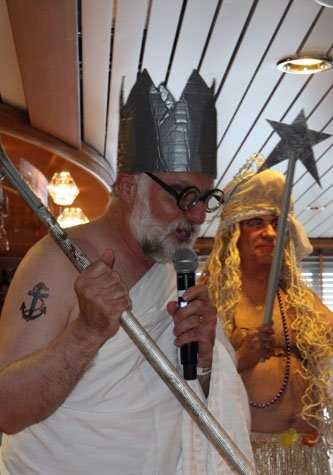Well, it happened. National Geographic Explorer was ill-fated from the beginning, doomed to cross the Equator with pollywogs aboard. Even though she tried to outrun him, King Neptune and his queen caught up to the ship about an hour after the official crossing. There were so many pollywogs aboard that the King and Queen stayed for over an hour, covering heads with meringue and rinsing everyone down with water, even cutting the tips of staff member’s hair. As tradition goes, those crossing the imaginary line for the first time must be cleansed of all southern-hemisphere (or northern-hemisphere, depending on your direction of travel) diseases and impurities. Once the meringue was sufficiently rubbed in, each guest or staff member was sent outside into the warm weather for a cool hose-down. In the past, on sailing ships, this ceremony was pretty nasty, involving old food waste and the shaving of heads. Though a bit tempered, the ceremony aboard the ship today was still quite high-priority, with a dead fish to kiss and a shot of “medicine” to be taken.
Just after the baptism, a floating pelagic seaweed called Sargassum was spotted at sea in huge rafts! Oceanographer Deb Goodwin hopped into a Zodiac with scientist Dennis Cornejo and undersea specialist Alyssa Adler. The trio went out to collect the seaweed, take a plankton tow of the surrounding water, and to take footage of what may be amiss below the Sargassum raft. This tow ended up in a collection of two different species of Sargassum, a few small crabs and small shrimp. Usually this type of seaweed carries many more juvenile creatures, giving them a sort of free floating ride across the ocean via currents.
At night, after a delicious meal for a ship full of newly initiated shellbacks, the captain and hotel manager Patrik, along with expedition leader Jim shared stories of Brazilian clearance in the past. With full bellies the guests listened to old tales, bedtime stories of a unique variety.




